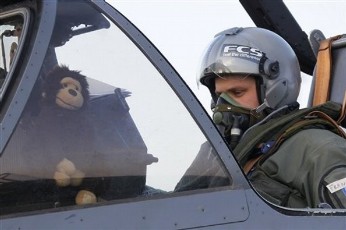Sudan denies granting permission for military planes operating over Libya
March 26, 2011 (KHARTOUM) – Sudan has not received any request by any party to allow military planes in its airspace to enforce the No-Fly Zone (NFZ) over Libya, foreign ministry spokesperson said today.

“Sudan received neither secret, not official request from the UN [to grant this permission],” Moussa told Russian state-controlled news agency RIA Novosti
“Sudan makes decisions proceeding from its national interests,” he added.
Also the spokesman of the Sudan Armed Forces (SAF), Colonel Khalid Sa’ad Al-Sawarmi told the pro-government Akhir-Lahza newspaper that he has nothing to confirm these claims.
On Thursday diplomats at the United Nations told Reuters that Khartoum has been quietly cooperating with a coalition of Western states that are patrolling the skies in Libya pursuant to UN Security Council resolution (UNSC) 1973 adopted earlier this month.
However, the decision does not oblige states to cooperate with the enforcement of the NFZ and makes it optional. Algeria, Egypt and Tunisia have reportedly declined to participate. Only Qatar and United Arab Emirates (UAE) have publicly announced they dispatched fighter jets to join the coalition dominated by Western countries.
Sudan’s U.N. ambassador, Daffa-Alla Elhag Ali Osman, neither confirmed nor denied that Khartoum had granted permission to coalition air forces.
“I cannot give you concrete information on this,” he told Reuters, adding he did not believe “a final decision had been made” by his government.
Sudan has endorsed an Arab League resolution calling on the UNSC to establish a NFZ over Libya. The African Union (AU) however, in a statement this month rejected any form of military intervention.
Western warplanes have flown more than 300 sorties over Libya and more than 162 Tomahawk cruise missiles have been fired in the United Nations-mandated mission.
A popular uprising in Libya against leader Muammar Gaddafi started mid-February that quickly turned into an armed rebellion where opposition managed to overrun government forces in the East and control major cities including Benghazi.
Gaddafi’s forces reportedly unleashed its air force against the opposition in the cities they controlled resulting in large civilian death toll and injuries. Furthermore, eyewitnesses said that African mercenaries were used by the Libyan regime who are implementing a ‘shoot-to-kill’ policy.
Khartoum may not have want its involvement made public for fear of alienating its Islamic base which is resentful of any association with the West particularly in the military arena even if they view the Gaddafi regime unfavorably. Reports of close cooperation between Sudan and Central Intelligence Agency (CIA) in places like Somalia and Iraq has already drawn criticism among the government supporters.
Libya borders Sudan and its western region of Darfur in which conflict between the Sudanese government and ethnic rebels killed 300,000 people and displaced more than 2.7 million since it erupted in 2003, according to UN figures.
Relations between the two countries have seen ups and downs particularly over the Darfur conflict. At one point Libya was accused of Sudan of aiding the Justice and Equality Movement (JEM) attack on Libya in May 2008.
However, it was Gaddafi that pushed the AU to grant Bashir immunity from arrest in the continent despite an arrest warrant against him issued by the International Criminal, Court (ICC) for his alleged role in Darfur war crimes.
Libya is currently hosting JEM leader Ibrahim Khalil after being refused entry by the Chadian authorities last year where he was based. Sudan has sought without success to have Libya expel him.
(ST)
